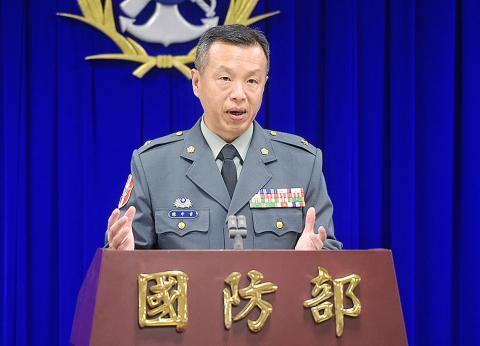The Ministry of National Defense is to obtain three asymmetric warfare weapons for the army and air force, in addition to the navy’s ongoing program to develop small fast-attack missile boats, an anonymous senior defense official said.
The army is to be given medium-range anti-tank missiles and a ground mobile minelayer system, and the air force is to be given a new gun-based close-in weapons system, the official said.
The ministry favors buying the equipment from domestic sources whenever possible and would consider buying from foreign suppliers only if local firms are unable to produce the weapons, the official said.

Photo: Chang Chia-ming, Taipei Times
The consultation period with domestic industries began earlier this month and the Ministry of Economic Affairs has begun a feasibility study of the nation’s capability to manufacture the weapons, they said.
The ministry is pressing forward with the fast-attack missile boat program, despite misgivings among members of the military and the shipbuilding sector, the official said.
The army needs anti-tank missiles and the minelayer system to combat enemy armor in anti-amphibious operations, the official said.
The air force’s request for a close-in weapons system was prompted by the rising threat of Chinese air and naval forces, which have been conducting exercises at the edges of Taiwan’s airspace, they said.
The close-in weapons system would protect installations on Taiwan’s east coast, particularly the Chiashan Base’s (佳山) underground complex in Hualien County, the official said.
A mission requirement for the minelayers, that they be capable of laying mines on Taiwan proper as well as Kinmen and Matsu, has sparked concerns from some ministry officials, sources said.
The officials have said that as the military has just completed clearing Kinmen and Matsu of landmines, procuring another minelaying system with such a mission requirement could alarm the public, the sources said.
Military procurements are determined by operational needs, ministry spokesman Major General Chen Chung-chi (陳中吉) said.
The minelayers would lay anti-tank mines, which comply with international conventions, not anti-personnel mines, Chen said.
Their operational role would involve laying mines on the likely approach routes of enemy armor units as battles develop, not emplacing semi-permanent minefields, he said.
In related news, the Taiwan Shipbuilding Industry Association yesterday began hosting a two-day media tour for major shipbuilders and defense industry firms involved in the manufacture of machinery, bullet-proof materials, and assault boats and helicopter maintenance.
Ko Lead Aerospace Co (科力航太), Jong Shyn Shipbuilding Co (中信造船), Chungshan Institute of Science and Technology, HCG Corp (和成集團) and Champion Auto Co (金賓汽車) are among the industries participating in the event.

TPP RALLY: The clashes occurred near the Chiang Kai-shek Memorial Hall on Saturday at a rally to mark the anniversary of a raid on former TPP chairman Ko Wen-je People who clashed with police at a Taiwan People’s Party (TPP) rally in Taipei on Saturday would be referred to prosecutors for investigation, said the Ministry of the Interior, which oversees the National Police Agency. Taipei police had collected evidence of obstruction of public officials and coercion by “disorderly” demonstrators, as well as contraventions of the Assembly and Parade Act (集會遊行法), the ministry said in a statement on Sunday. It added that amid the “severe pushing and jostling” by some demonstrators, eight police officers were injured, including one who was sent to hospital after losing consciousness, allegedly due to heat stroke. The Taipei

NO LIVERPOOL TRIP: Taiwan’s Lin Yu-ting, who won a gold medal in the boxing at the Paris Olympics, was embroiled in controversy about her gender at that event Taiwanese boxer Lin Yu-ting (林郁婷) will not attend this year’s World Boxing Championships in Liverpool, England, due to a lack of response regarding her sex tests from the organizer, World Boxing. The national boxing association on Monday said that it had submitted all required tests to World Boxing, but had not received a response as of Monday, the departure day for the championships. It said the decision for Lin to skip the championships was made to protect its athletes, ensuring they would not travel to the UK without a guarantee of participation. Lin, who won a gold medal in the women’s 57kg boxing

‘NOT ALONE’: A Taiwan Strait war would disrupt global trade routes, and could spark a worldwide crisis, so a powerful US presence is needed as a deterrence, a US senator said US Senator Deb Fischer on Thursday urged her colleagues in the US Congress to deepen Washington’s cooperation with Taiwan and other Indo-Pacific partners to contain the global security threat from China. Fischer and other lawmakers recently returned from an official trip to the Indo-Pacific region, where they toured US military bases in Hawaii and Guam, and visited leaders, including President William Lai (賴清德). The trip underscored the reality that the world is undergoing turmoil, and maintaining a free and open Indo-Pacific region is crucial to the security interests of the US and its partners, she said. Her visit to Taiwan demonstrated ways the

The US has revoked Taiwan Semiconductor Manufacturing Co’s (TSMC, 台積電) authorization to freely ship essential gear to its main Chinese chipmaking base, potentially curtailing its production capabilities at that older-generation facility. American officials recently informed TSMC of their decision to end the Taiwanese chipmaker’s so-called validated end user (VEU) status for its Nanjing site. The action mirrors steps the US took to revoke VEU designations for China facilities owned by Samsung Electronics Co and SK Hynix Inc. The waivers are set to expire in about four months. “TSMC has received notification from the US Government that our VEU authorization for TSMC Nanjing